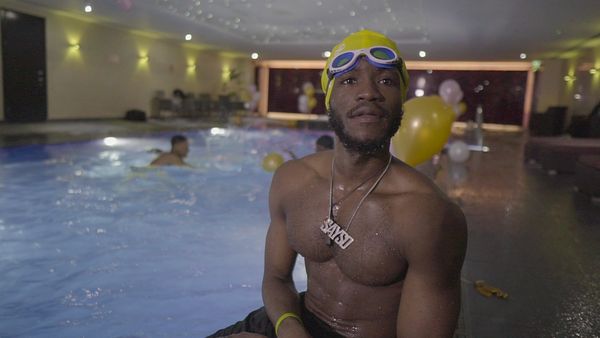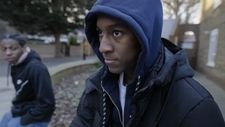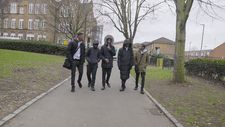 |
| Blacks Can't Swim: Rewind |
Ed Accura is a successful rapper, songwriter and producer, but at the age of 53 he realised there was still one challenge he needed to overcome: he couldn’t swim. What’s more, neither could 95% of other Black British adults, and 80% of their children. This led him to make A Film Called Blacks Can’t Swim, directed by Mysterex, about his own journey to the point where he was ready to get into the water. There was a massive community response to the film and numerous people have cited it as the reason why they learned to swim. Ed co-founded the Black Swimming Association, and last year he and Mysterex made Blacks Can’t Swim: The Sequel. Now they’re back with Blacks Can’t Swim: Rewind. I asked Ed what prompted him to return to the subject for a third time.
“There's an issue with water safety,” he says. “We have the highest drowning rates. So I said to myself, ‘If you're going to change history here, it's going to be done with the younger generation.’ Because people like myself in their thirties, forties, fifties and sixties, don't learn how to swim, but you could change the younger generations and their attitudes towards swimming. Then they grow up, they become parents and their children automatically swim. So therefore we break that myth, that stereotype.
 |
| Blacks Can’t Swim: Rewind |
“So when I finished the sequel, I said to myself, I'm going to take a break, but on the second day after the première, I started getting calls from people, especially adults. I said, pause your story, just keep your stories, I'll create a platform for it. That platform was Rewind, and the reason why I called it Rewind was it’s rewinding back to the parents to understand their stories and see how that affects their kids. That's why there are so many family stories and family interviews in it.”
When I ask how he found the participants, he smiles.
“I know them. I know every single person. I'll probably be on my 20th film before I run out of people that I know. So many people have stories, and it's such a big issue. But it's normal now that we're hearing their stories to do with swimming.
“I've had a lot of people tell me that as a result of what I am doing and what the Black Swimming Association is doing, they have decided to go back to swimming. And I had a lot of people tell me that they're trying to get their children into swimming. So it's yeah, it's doing what it's supposed to do.”
The films combine elements of documentary and drama. Is that an approach with he has found resonates well with his target audience?
“Yes,” he says. “I'd like to say the most important part of the film is the documentary, the interview part of it, but you want to keep the audience engaged and entertained, and so this was a two pronged attack. So basically, the interviews have the real life lived experience. The storyline is fictional, but based on real life. I didn’t want to cast actors. Every person in there is someone within the community, because it's inspired by them.
 |
| Blacks Can’t Swim: Rewind |
“The whole idea of it was, basically, to be about swimming. It was not until I'll halfway through the film that I realise we’d taken a different turn here, because the young gentleman there, three or four of them that are the main characters, are kids that were introduced to me by a certain gentleman who mentors these children, because they were at the cusp of going down the wrong road. Some of them are from broken families, most of them are from a low socioeconomic background. And so it's given them an opportunity.
“One of them came up to me and said to me, ‘Thank you very much for giving me this opportunity.’ And now, basically, long story short, he decided just to walk away from a gang, because he sees something else out there. And I was like, ‘Wow!’ That was not my intention and I'm not taking credit for that, but that's what it has done.”
He chose the particular stories we see in the film because he wanted to show that this issue affects people regardless of class, he explains. It’s a cultural issue, and people from different backgrounds tell him similar stories.
“The majority of young females, when they get to a certain age they discover their bodies, their hair, boys, they just walk away from swimming. And I'm talking to a lot of friends who have said that their daughters get to that age and they don't really swim anymore.”
Part of the film deals with swimming in schools, and I mention that it struck me that few white teachers would know what to do if a Black girl said she didn’t want to swim because of how it would affect her hair. He nods vigorously.
“The problem is, if it's not a live experience, then you wouldn't know about it. I've had a lot of people come up to me and say, ‘I didn't know that.’”
 |
| Blacks Can’t Swim: Rewind |
The same is true, he says, of the notion that Black people have denser bones than white people and are therefore unable to float – something which was new to me when I watched the film.
“Some people might just laugh at it,” he says. “But it's so important that the Black Swimming Association are working with RNLI and Portsmouth University to do some physiology research on why this is, to see if Black people can float or if they can’t float. RNLI is one of our biggest partners. And they came to us last year and said, ‘We're doing this float lead programme whereby if you get into a situation in the water, just lit on your back like a starfish and wait for help. Can you please spread that message within the communities?’ And we said, ‘Well, no, we believe we can’t float.’ And they said ‘What do you mean?’ I said ‘That's the thing. A lot of people think they can’t float because of heavy bones.’ As a result of that we decided to do research to find out why this is so and if this is so, how can we get around this?
This is part of a wider programme of research which includes exploring the reasons why people do or don’t swim, he explains.
“ When we founded the Black Swimming Association, we had all these organisations coming up to us and saying ‘Let's do this. We've got these plans.’ No, no. You've been trying to get through to the community, you haven't been able to because you didn't know how to, but now you're here at the bridge between the sector and the community that does not swim.
“It's like going into a doctor's office and you walk in the door, and the doctor says, ‘Oh, I've got this medicine for you.’ You can't do that. You have to sit down, listen to them, find out what the problem is before you prescribe, yeah? So let's do the research. And that's what we're doing right now. Hearing people's lived experiences, people's stories.”
It’s already making a difference, he says, with more young Black people getting into swimming.
 |
| Blacks Can’t Swim: Rewind |
“We are hearing it every day, we hear a lot of people talking about it now. One thing someone told me that always sticks in my mind, she said to me, ‘As a result of the first film that you did, and the name you gave it, it made it easier for us to have a conversation with previously was very uncomfortable to have. And when I decided to call the film A Film Called Blacks Can’t Swim, a lot of people told me ‘Don’t, don’t! You're adding to the stereotype. Call it something else.’ But I was determined. And I said, ‘No, I'm going to call it that,’ because I was talking about my personal journey. And I listened to all the stereotypes, and believed I couldn't swim. So I'm talking about my past. And I'm very happy that I stuck to my guns.”
Another thing which this film looks at is the importance of role models. Is part of the problem down to the fact that there are far too few black faces in swimming at a higher level that might be noticed?
“Yes, yes,” he says decisively. “Not even just at a higher level, just in general. I think one of the gentlemen in that interview said that if one of the rappers came out and said, ‘Oh, I’m swimming,’ the next day the pool would be packed, because kids are more likely to listen to role models and people that inspire them rather than their parents. And that's a fact.
“I spoke to my my brother, my brothers in the film. And his little boy is eight or nine years old. And listen to this now, this is how bad it is. He asked his dad to write him a note because they were talking about doing swimming at school. He didn't want to do it. And why is that? Because people said that we don't swim. So I said okay, so why don't you want to swim? ‘Because it looks hard. It looks difficult, and it's not cool.’ I said, So who's your favourite rapper? If he swam, would you?’ and he said ‘Yes!’ straight away. So it goes to show that role models really, really help.”
We talk about our personal experiences with swimming; I explain that I insisted on getting lessons when I saw seven because I didn’t like being afraid of the water. Remembering what that did for me, I ask if his discovery that he was able to swim helped him in life more generally.
 |
| Blacks Can't Swim: Rewind poster |
“It boosts your confidence,” he says. The first time I ever got into a pool to learn how to swim was in the ending scene of A Film Called Blacks Can’t Swim. So when you see me walking down into the pool with my instructor there, that horror on my face, that shock in my face, that’s not acting. That's real life. That's real. But it's important. I mean, okay, it’s a pleasure going swimming, but first and foremost, it's water confidence and water safety. So any fear that you have, you push it aside and just go for it. And that's what I did.
“What the film does is it highlights the issue, about all the people who do not swim. And what the Black Swimming Association does, it addresses the issue. So although the film sits outside of the BSA, that is a very, very, very strong relationship. And I think that one thing that has to happen for anything to happen is we have to keep on talking about it. The more we talk about it, the more we can break down those barriers. Just keep on having a conversation, and I'm pretty sure we’ll change the narrative.”
Blacks Can’t Swim: Rewind is available on Digital Download from 4 July.





















